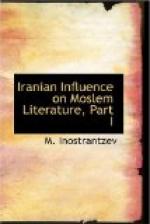[Footnote 1: Fihrist 304, 10-305, 2. Fihrist 306, 6; Fihrist 305, 7.]
CHAPTER III
The ethico-didactic books in the Fihrist (315, 19-316, 25) 38
They are almost exclusively of Persian origin 38
ETHICO-DIDACTIC LITERATURE OF IRAN
Opinion on the importance of the influence of ethical and didactical works of the Sasanian times on the literature of this class of early Moslem epoch, generally speaking has been expressed in scientific works and has found admittance into a few general surveys of Persian literature. To the literary monuments go back a number of books on what is called Adab, good behaviour or agreeable manners, in modern Persian literature. Besides several literary monuments of later ages,[1] for the solution of this question, capital importance attaches to the information given in the Fihrist of an-Nadhim which is the fundamental source of the history of entire Arabic literature bearing on our period. Further on we shall draw upon this work with the object of determining this species of literary tradition in Arabic books of the first centuries of Islam.
[Footnote 1: P. Horn, Geschichte der persischen Letteratur, (Die Letteraturen des Ostens in Finzeldarslellungen Bd VI) 38, and Die Mittelpersische Letteratur, 237.]
Great importance for this problem lies in that portion of the Fihrist which when first edited had elicited little interest, and where are enumerated the titles of books of ethico-didactic character, Persian, Greek, Indian, Arabic, by well-known authors and by anonymous writers[1]. We are aware that in the Fihrist there are partly Arabic, partly Persian, titles of books which have come down to us in a mutilated form, but at the same time some of them have reached us in their correct shapes and others are often easily restorable.
[Footnote 1: Fihrist 315, 19-316, 23.]
In this section of the Fihrist we have in all forty-four titles of books. Among them a large number can be directly traced to Persian origin and a portion were evidently written under Persian influence. To the first class we have no hesitation in assigning fourteen names of books, since as we shall see, two of them or possibly three pertain to one and the same work. We will examine these titles in some detail.
1. The first book is by Zadan Farrukh and is a testament to his son[1]. Although we are not able to recall a book of this title among the Pahlavi literature that has come down to us, still the general character of this work is presented to us in perfect definiteness. It is undoubtedly one of the testaments or counsels, the so-called Pand Nameh or Andarz, of a father to a son, or some one person to another, and the typical representatives of which in the Pahlavi literature appear to be the well-known book of testament of Adarbad to his son, the book of advice to his son by Khosro Anushirvan and the book of counsel to the latter by his Wazir, Buzurj Meher[2].




